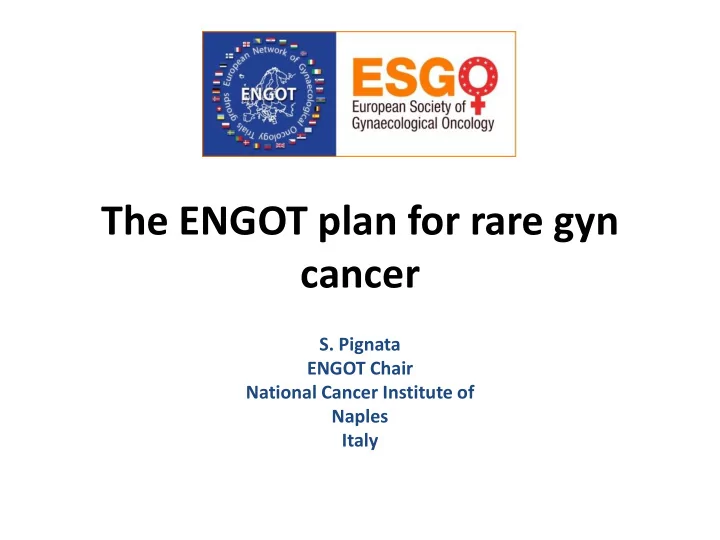

The ENGOT plan for rare gyn cancer S. Pignata ENGOT Chair National Cancer Institute of Naples Italy
Rationale for ENGOT rare cancer plan • Progress in gynaecologic oncology needs clinical studies, translational research and cooperation … • In rare tumours questions are complex and definitive answers need trials within reasonable time. • Trials are unfeasible by a single National group
ENGOT MAP 2017 SGCTG PGOG GROINS NCRI EORTC- GCG AGO-Germany BGOG GINECO TRSGO GEICO HeCOG MaNGO MITO ISGO
October strategic meeting • Decision taken to promote a specific plan for rare cancers • Questionnaire to the groups to collect all ongoing activities • Identification of a single person per group joining this working group
• 45 different projects were declared (retrospective, prospective registry, phase 2 trials) – 23 projects happy for external collaboration – 10 projects overlapping, possibly able to merge – 2 projects combine registry and tumour sample collections Meeting in september to present the projects and to be discussed about collaboration or improvement ….
Plan • Meeting in september with the rare tumour representatives • Presentation of the trials searching collaboration; discussion on possible merging of initiatives • Discussion on type of studies to be performed
Type of trials • Retrospective (studies that can involve all ENGOT groups) • Registry/prospective • New drugs in specific disease (i.e. Alienor) • New drugs (umbrella trials in rare gyn disease) • «Joint-Venture» duplicating clinical trials for future meta analysis (NRG/D Gershenson Project) • Tumour banking (trial specific or connected to registries)
A randomized, 3-arm phase III trial of paclitaxel/carboplatin versus paclitaxel/carboplatin/maintenance letrozole versus letrozole monotherapy in patients with stage II-IV, primary low-grade serous carcinoma of the ovary or peritoneum • CT O arm acceptable Observation until disease progression • letrozole monotherapy or severe toxicity Paclitaxel + arm acceptable? Randomizati Carboplatin on #2 x 6 cycles • Use of bevacizumab? Letrozole until Eligib disease progression • Feasibility of parallel le or severe toxicity Randomizat Patie ion #1 trials with single data nts center anticipated Letrozole until Letrozole x 6 disease progression Meta analysis cycles or severe toxicity • TR biomarkers Randomization #1 will be done in a 5:2 ratio (250 to CT, and 100 to L) Stratified by residual disease (< 1 cm vs > 1 cm) Randomization #2 will be done in a 1:1 ratio Stratified by no persistent vs persistent disease ENGOT network to make it a big GCIG trial
ENGOT Biobanking J Sehouli; I Braicu
Conclusions • A plan to improve research for rare gyn cancer in ENGOT • Close collaboration and regular update to GCIG • Thanks to Isabelle and sorry for not being with you • CIAO!!!
SoA project (Lyon, Automne France 2018) • Goals – evidence base for diagnose and management of rare gynecological cancers. – multidisciplinary conference will provide comprehensive state-of-the art summaries from key note speakers, – Audience Gyn, Onco, Onco-gyn, RT, biologists – Up to date scientific reviews on • biology, • biomarkers, • preservation of fertility, • specificity by subgroups of rare cancers, • updated GCIG/ESGO guidelines, • unanswered questions and future clinical trials.
SoA project (Lyon, France Automne 2018) 400 to 500 persons • Organisation – Faculties 20 to 30 speakers – 2 days meeting • General sessions • Breakout sessions • Lecture – Sponsoring • Industries • ESGO • …
Recommend
More recommend